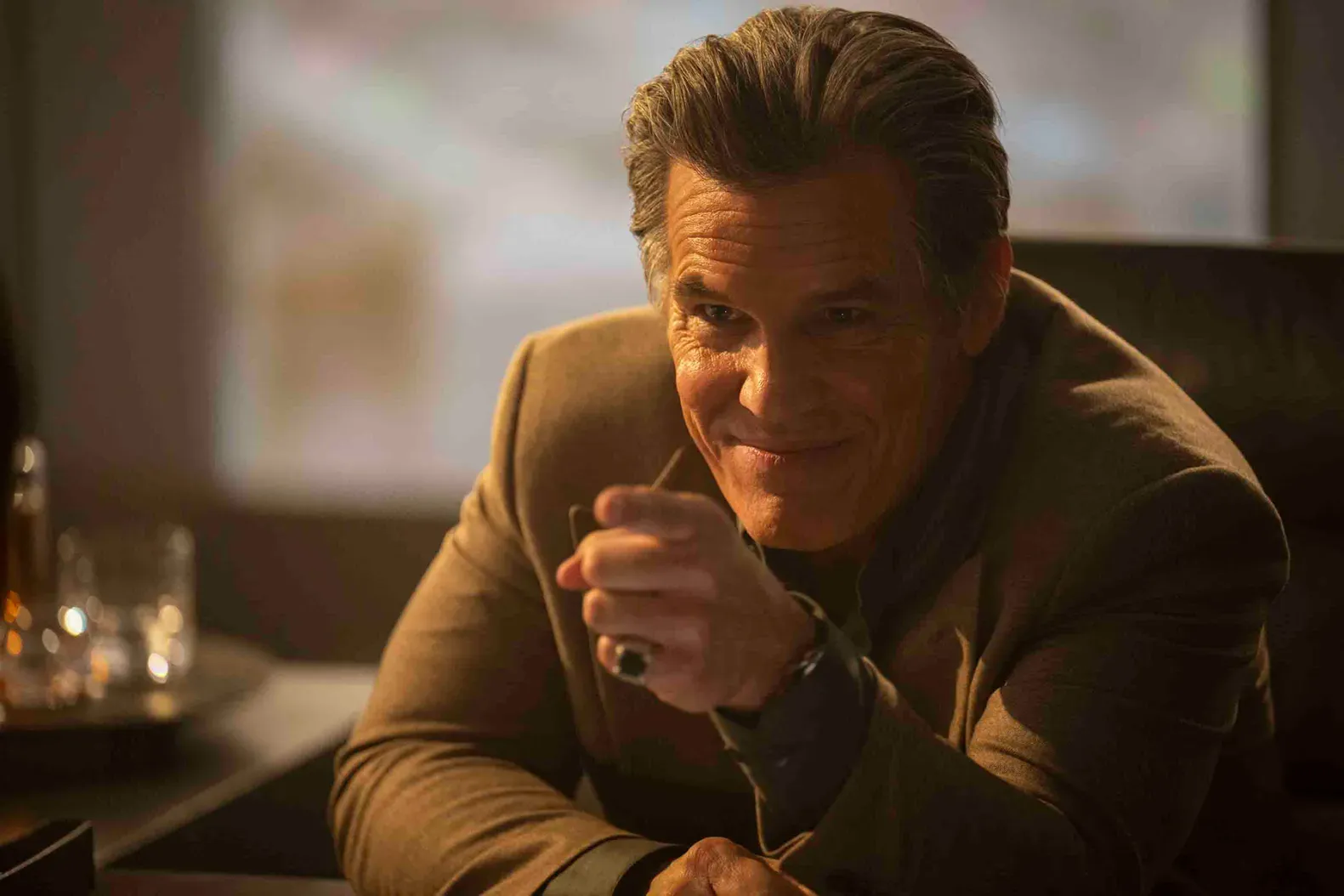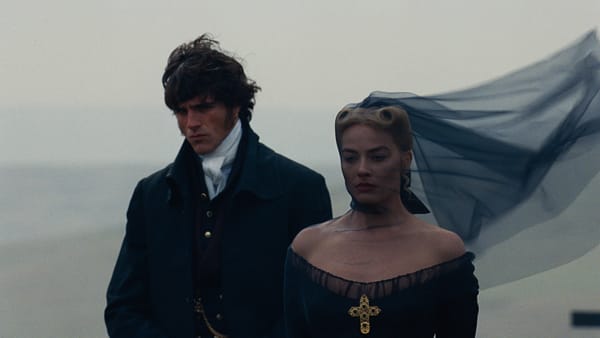The Running Man (2025) Review: Edgar Wright's Political Actioner Can't Go the Distance
Glen Powell keeps the pace moving, saving as much of the movie as he can.

This post is free but it’s worth it to become a paid member of The Film Maven community! Paid subscribers are the backbone of The Film Maven who support independent journalism, as well as female- and disabled-created content. Paid Film Mavens get access to two-three exclusive articles a week including access to my series The Trade and Popcorn Disabilities, as well as the ability to chat with me on The Film Maven's Discord server.
Don't want to commit to a subscription? Leave a tip to show you enjoy what you're reading.
Be sure to add The Film Maven to your accepted emails so they don't end up in spam!
Enjoy what you’re reading? Share it with friends. Help us get to 1,000 subscribers by the end of 2025 and I’ll do a full written and video review of Francis Ford Coppola’s Megalopolis.
In 1982, Stephen King released his book The Running Man. Adapted in 1987 as a vehicle for Arnold Schwarzenegger, the frank dystopian novel's rougher edges were sanded down for what became a stand '80s actioner. In the hands of director Edgar Wright, this new take on King's novel—the fourth adaptation of a King vehicle this year alone—is all sharp edges, hyper violent and reveling in its R-rating. But for all the fun Wright and star Glen Powell seem to be having the movie suffers from a script that can't find its footing.
Ben Richards (Powell) is a working man blacklisted from every job in the city after telling a union rep about radiation exposure. His toddler daughter is sick and in the hopes of saving her he decides to become a participant in a violent gameshow known as The Running Man. The goal of the show: survive thirty days with the entirety of the world hunting you down. If you win? You get a billion dollars. Ben starts to play the game but comes to realize that, no matter what, game show network owner Dan Killion (Josh Brolin) will rig the game no matter how he has to.
The Running Man's first hour is a crackling action adventure with the zing of Edgar Wright's best features, and Powell certainly understands the assignment. We meet Ben as he's begging his former boss for his job back. Ben is a man known for doing the right thing at the wrong time, routinely referred to as angry by everyone who knows him. Powell certainly keeps the roiling hostility just bubbling at the surface, averting his gaze and cuddling his child, whom he takes to the meeting in order to keep from beating his boss to a pulp. It's clear this is a man angry at the world, at the circumstances that have led to him begging for work.
The script, credited to Wright and Michael Bacall, takes a feverish pace at setting up the dystopian world. Ben and his wife, Sheila (Jayme Lawson) live in the slums. His wife is a waitress in a club and Ben takes it personally when anyone claims she's a sex worker, though in King's novel the character was. But already the cracks in the movie are evident. Sheila and Ben's daughter Cathy aren't characters but perpetual pawns trotted out anytime Ben needs sympathy. Outside of the establishing scene we don't see them again outside of a halcyon, stock image of Sheila and baby Cathy that plays like two character who have been sent to the afterlife. His constant refrain that no one's going to prevent him from seeing his daughter again becomes meme-like in how often he uses it.

Purely by accident Richards ends up on The Running Man, one of several moments where Ben takes a severe left turn into being incredibly dumb. But Killian believes Ben can go the full thirty days, and encourages Ben to use his anger to win. The central casting is great and Brolin understands the assignment so perfectly. He's charming, manipulative, smarmy, and eating that scenery like it's going out of style. Why would Ben believe anything a guy who acts like a modern-day Bond villain says? Who knows. But Brolin is thriving in every sequence of this movie and it never feels like there's too much of him. Also, shout-out to Lee Pace as head Hunter McCone, a masked villain having so much fun you miss him when he's gone.
Once Ben goes on the run the movie's pace changes. The action is ramped up but Powell is the sole character we interact with. This leads to heavy amount of color commentary given, either from Ben himself or others. Ben, alone in a hotel room with no one to talk to, goes on an extended bit of what the bums outside are saying. This causes problems later, during the big third act airplane scene, when Running Man host Bobby T (Colman Domingo, flawless as ever) proceeds to tell the audience in the show everything that the audience, in the theater, is watching. It's cumbersome and doesn't work in the way the screenwriters intended. It just feels like a lot of people talking over something we just want to watch and enjoy.
Ben has help along the way from characters who aren't three-dimensional but are essentially political archetypes you see on social media. Daniel Ezra's Throckmorton is this world's equivalent of a conspiracy theorist YouTuber who provides necessary exposition about the show being rigged while Michael Cera's Elton is another conspiracy theorist trying to push the message that The Network controls everything. Cera's character gets some clunky exposition that sets him up as the nerdy freedom fighter hoping to get Ben to his father's bunker. But when that goes pear-shaped the entirety of the bunker storyline just....ends.
The Running Man's fatal flaw is how shoddy the script is. Characters are stock and plot points don't come to any form of natural conclusion but just fall away. This also forces Ben Richards to be either the smartest, most action-y man of all time, or the dumbest sack of rocks depending on the situation. Ben knows the Network manipulates the videos he's sending in, a requirement of the game, yet is incredibly quick to believe something Killian shows him in the finale.

In one sequence he appears to dream that his friend and ally Molly (William H. Macy) is killed and that the goons are coming for him. Yet he wakes up before anything happens. Never is there a question of Ben's apparent prophecy skills and even after that he still proceeds to take a shower, being caught in a towel that does a lot of work as he scales the side of a building. Later on he seems to know Molly isn't around anymore but how?
It's a problem that intensifies as the movie reaches its third act. Emilia Jones's Amelia Williams, a hostage Ben takes, becomes the straw-woman centrist, espousing that she's a "good person" while talking about poor people killing law enforcement. The politics of the movie are as messy as can be. Ben Richards is the stock "I don't care about politics, just my family guy" while everyone else talks in platitudes about their political ideology, all of which are heard so often today you'll believe you're watching a newscast.
But Wright and Bacall engage in a very rose-colored glasses view of politics. Amelia isn't a bad person, she just needs to spend time with Ben to learn he (and the poor people he stands for) are good. The movie's racial politics are also very cring-y. The Black wife and child become the poor victims held aloft by Ben as means of showing how good he is, giving him a real white savior complex the movie does nothing to dispel.
Then there's the ending which reeks so much like studio interference it might as well have "Approved by Paramount" stamped across it. "Just kidding" endings only work if the audience gets to see enough to craft the ambiguity. Here, the movie quite literally stops as a character lays out what "really happened" leading to an additional 10 minutes of movie that looks reshot--Brolin is wearing a wig in one scene–that leaves the audience saying, "Wait, what?" Considering the original ending of the book, which the movie sets up, it's such a jarring piece of ridiculousness that one can't believe it was initially written that way.
Powell, Brolin and Pace do a lot to make The Running Man as fun at is, at least for the first hour. There are fits and spurts of '80s action cheese but, for the most part, the script is wildly inconsistent in terms of tone while characters are wafer thin caricatures. It's disappointing that a director with such a formidable voice and a love of movies can make something that feels like the cinematic equivalent of a runner who sprains his ankle before the finish line.
Grade: C-
The Running Man is in theaters Friday.
Are you a fan of The Running Man, in any incarnation? Let me know what you think about it or this movie in the comments below.
Upcoming Popcorn Disability Events
Come to the OC Book Fair on November 15th at 4pm where I'll be participating in a panel on disabled voices in literature and signing copies of Popcorn Disabilities. You can find out more at the OC Book Fair website.
If you're in Los Angeles on November 16 drop by the Los Feliz 3 where I'll be introducing Tod Browning's Freaks before signing copies of my new book Popcorn Disabilities: The Highs and Lows of Disabled Representation in the Movies. You can buy tickets via this link right now.

![Gore Verbinski and Cast Talk the Urgency of Good Luck, Have Fun, Don't Die: 'The World Is Screaming the Answer' [Video]](/content/images/size/w600/2026/02/MV5BMzMyMzgwMzYtMjFjNS00YmQ4LWEzNWMtNzI2YTI3MDAyZTUyXkEyXkFqcGdeQWFkcmllY2xh._V1_.jpg)


